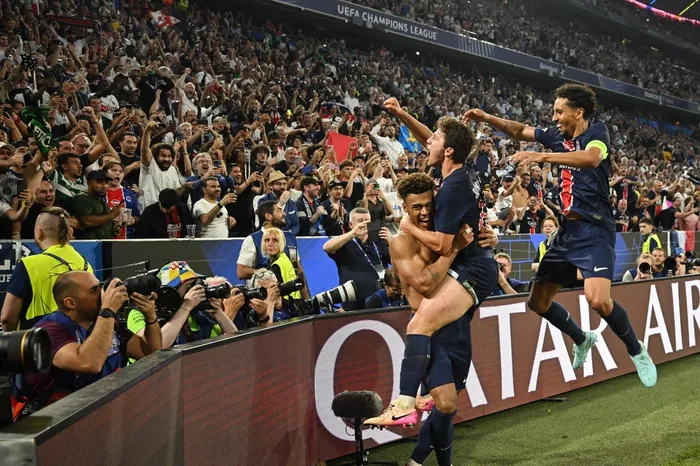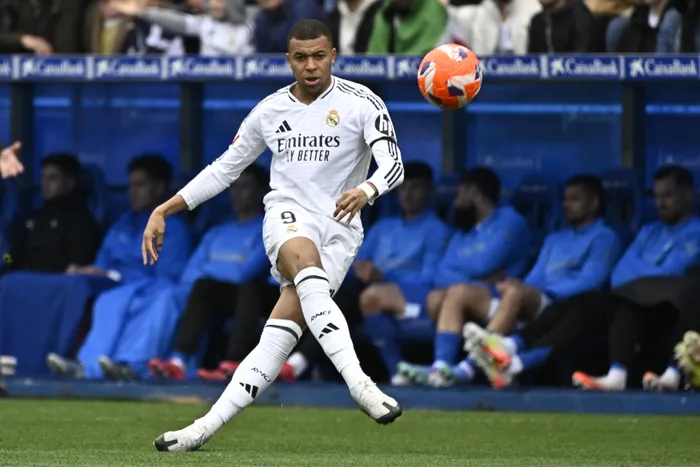PSG lead new revolution rooted in youth, unity and smart spending
On the Ball

Paris Saint-Germain's Desire Doue, centre, celebrates with Joao Neves and Marquinhos after scoring PSG's third goal during the Uefa Champions League final against Inter Milan in Munich on Saturday night. Photo: AFP
Image: AFP
The revolution in Paris that led Luis Enrique’s team to Uefa Champions League glory for the first time is being echoed across Europe, as even clubs that once embodied the Galácticos-era have abandoned efforts to ‘buy’ the top prize in European football.
The PSG coach is now reaping the plaudits for building an energetic, youthful and dynamic team that is mesmerising to watch. It is built on teamwork and unity of purpose, rather than relying on the individual brilliance of former megastars, such as Kylian Mbappé, Neymar or Lionel Messi.
Youngsters like Désiré Doué, Warren Zaïre-Emery, Bradley Barcola and Senny Mayulu have Paris fans salivating at the prospect of years of European dominance.
The change in direction at PSG, majority-owned by Qatari government-backed investment fund Qatar Sports Investments, is not unique.
Barcelona won La Liga with a modestly priced squad — by their former lofty standards — and an increasing reliance on young, homegrown talent.
Even the pioneers of the Galácticos-era, Real Madrid, are no longer throwing ‘silly money’ at the world’s best players. Then again, they don’t need to — playing at the Bernabéu remains the dream of countless players, particularly those nearing the end of their contracts.
The relatively slow pace of deals announced so far in the current transfer market may indicate a more cautious approach to player recruitment, even among teams with clear squad gaps. The need to abide by financial fair play rules may be a factor, but it does not entirely explain the shift in mentality.

Kylian Mbappe left PSG for Real Madrid. His former team seem to have only got stronger since his departure.
Image: Ander Gillenea / AFP
In England, traditional big spenders Manchester City recently withdrew from the race for Germany international star Florian Wirtz, citing an unrealistic price tag. That has left the door open for champions Liverpool, who are reportedly closing in on a deal worth more than £100 million for one of the most in-demand players in Europe.
There was a time when such high-profile signings were considered the exclusive preserve of only a handful of clubs, but the times are changing. City also made no blockbuster signings during the January transfer window, despite being one of the more active clubs historically.
Newcastle United are yet to fully flex the financial muscle of Saudi Arabia’s Public Investment Fund (PIF), but that could change with a return to the Champions League for Eddie Howe’s overachievers.

The party has seemingly not stopped in Paris since PSG won the Uefa Champions League. Photo: AFP
Image: AFP
The positive outcome of this shift away from the excessive spending of recent seasons has been an overall improvement in the quality of football on display and increased competitiveness in domestic leagues.
Clubs previously bled dry by their richer neighbours can now build around their star players, without constant fear of losing them to financial giants. This may help explain why the most recent Premier League season was such a compelling spectacle, with Champions League places decided on the final day.
Managers with a keen eye for talent that others have overlooked—or discarded—came to the fore, with a data-driven ‘moneyball’ approach to recruitment at the heart of their success.
Clubs with modest budgets were able to go toe to toe with traditional powerhouses of the English game. The ‘big six’ are clearly no longer the definitive top six, and fallen giants like Manchester United may struggle to reclaim their place at the summit as they embark on major rebuilds in this evolving market.
Yet, PSG have shown that reinvention is possible.
Viva la révolution!
